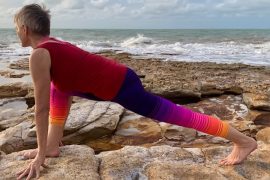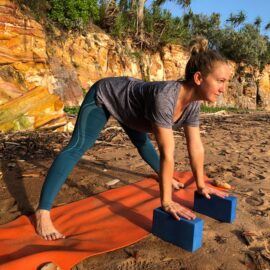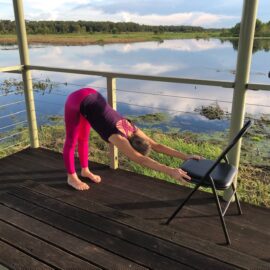Insomnia? Yoga nidra for sleep helps. But also just yoga or meditation.
Yoga is a key part of the sleep solution
Yoga nidra for sleep is useful, but just regular yoga will work well
The deadly impact of insufficient sleep is summarised in the extract below from Professor Mathew Walker’s book. To get the sleep you need, it can help to use guided meditation like yoga nidra for sleep. But just regular yoga or breath meditation, or both, will do everything you need.
First, let’s talk about why you need enough sleep, and the terrible impact of not getting enough of it.
Professor Walker is probably the world’s top expert on sleep. He as specialised in it for all of his working life.
That’s why I’ve included the long extract below on the many terrible impacts of not getting enough sleep.
It’s hard to say anything about sleep with more power and credibility that Professor Walker.
Depending on how you motivate yourself, I think it’s useful to know the downside of not enough sleep, as well as the upside of what sleep can do for you.
At least scan the summary from his book, that I’ve included below. Then I’ll outline how you can start very easy yoga to give you a lifelong solution. It’s simple, and not nearly as slow or mysterious as yoga nidra for sleep.
For me, Professor Walker has been even more motivation to do regular yoga and breath meditation, with the yoga for sleep poses I outline in another post.

Bridge pose for stress & sleep
Professor Matthew Walker on the deadly impact of insufficient sleep
“….Routinely sleeping less than six or seven hours a night demolishes the immune system, more than doubling the risk of CANCER.
Insufficient sleep is a key lifestyle factor determining whether or not ALZHEIMER’S disease will develop.
Inadequate sleep—even moderate reductions for just one week—disrupts blood sugar levels so profoundly that it would be classified as PRE-DIABETIC.
Short sleeping increases the likelihood of coronary arteries becoming blocked and brittle, setting things on a path toward cardiovascular disease, stroke, and congestive HEART FAILURE.
Fitting Charlotte Brontë’s prophetic wisdom that “a ruffled mind makes a restless pillow,” sleep disruption further contributes to all major psychiatric conditions, including DEPRESSION, ANXIETY, AND SUICIDALITY.
Too little sleep also swells concentrations of a hormone that makes hungry feelings while suppressing a companion hormone that otherwise signals food satisfaction. Despite being full, there is still a desire to eat more. “*
All of the above horrors are why I’m such a regular user of simple yoga poses for sleep, without ever needing to delve into even yoga nidra for sleep. Regular yoga works wonderfully.
Professor Walker on weight gain and life span
“It’s a proven recipe for WEIGHT GAIN in sleep-deficient adults and children alike.
Worse, should there be an attempt to diet but if one does not get enough sleep while doing so, it is futile, since most of the weight lost will come from lean body mass, not fat.
Add the above health consequences up, and a proven link becomes easier to accept: the shorter the sleep, the shorter the LIFE SPAN.
The old maxim “I’ll sleep when I’m dead” is therefore unfortunate.
Adopt this mind-set and be dead sooner, and the quality of that (shorter) life will be worse.”*
Sleep is a bigger problem for driving than alcohol or drugs
“There’s more….DROWSY DRIVING is the cause of hundreds of thousands of traffic accidents and fatalities each year.
And here it is not only the life of the sleep-deprived individuals that is at risk, but the lives of those around them.
Tragically, one person dies in a traffic accident every hour in the United States due to a fatigue-related error.
It is disquieting to learn that vehicular accidents caused by drowsy driving exceed those caused by alcohol and drugs combined.
….Sleep dispenses a multitude of health-ensuring benefits, to pick up in repeat prescription every twenty-four hours, should one choose. (Many don’t.)
Within the brain, sleep enriches a diversity of functions, including our ability to learn, memorise, and make logical decisions and choices.
Benevolently servicing our psychological health, sleep RECALIBRATES OUR EMOTIONAL BRAIN CIRCUITS. This allows us to navigate next-day social and psychological challenges with cool-headed composure.
We are even beginning to understand the most impervious and controversial of all conscious experiences: the dream.
Dreaming provides a unique suite of benefits to all species fortunate enough to experience it, humans included.”*
Creativity, infection, and blood pressure
“Among these gifts are a consoling neurochemical bath that mollifies painful memories. It’s a virtual reality space in which the brain melds past and present knowledge, inspiring CREATIVITY.
Downstairs in the body, sleep restocks the armoury of our immune system, helping fight malignancy, PREVENTING INFECTION, and warding off all manner of sickness.
Sleep reforms the body’s metabolic state by fine-tuning the balance of insulin and circulating glucose.
Sleep further regulates our appetite, helping control body weight through healthy food selection rather than rash impulsivity.
Plentiful sleep maintains a flourishing microbiome within the gut from which we know so much of our nutritional health begins.
Adequate sleep is intimately tied to the fitness of our cardiovascular system, LOWERING BLOOD PRESSURE while keeping our hearts in fine condition.”*
Nutrition, exercise and sleep are the “health trinity”
“A balanced diet and exercise are of vital importance, yes. But we now see sleep as the preeminent force in this health trinity.
The physical and mental impairments caused by one night of bad sleep dwarf those caused by an equivalent absence of food or exercise.
It is difficult to imagine any other state—natural or medically manipulated—that affords a more powerful redressing of physical and mental health at every level of analysis.
Based on a rich, new scientific understanding of sleep, we no longer have to ask what sleep is good for.
Instead, we are now forced to wonder whether there are any biological functions that do not benefit by a good night’s sleep.
So far, the results of thousands of studies insist that no, there aren’t.
Emerging from this research renaissance is an unequivocal message. Sleep is the single most effective thing we can do to reset our brain and body health each day.” *
So let’s have a quick chat about how to improve sleep, without using pills. They cause another whole set of other issues, and don’t solve the underlying problems, like stress and anxiety.
Studies show that anxiety has also jumped up hugely in this Age of Covid19.
Better sleep via simple yoga. (Yoga nidra for sleep is an optional extra).
Yoga gives you a systematic, regular process to improve both sleep and sleep quality.
The next 6 week beginner yoga course, with up to 2 weeks free, is one good way to start.
You get an unlimited mix of beginner classes, online or in-the-studio, or both.
The beginner poses are easy, introductory poses.
Almost anyone can do yoga, including those with particular conditions that need especially easy poses, or individual variations of poses.
There are special, optional beginner classes like Gentle Yoga, Backcare Yoga, and Easy Restorative Yoga.
See all beginner classes and options in the beginner timetable.
You can also start at any time via a Beginner Yoga week-to-week pass. It’s online or in-studio, or both, with a 2 week free trial and money back guarantee.
Ideally, bring your partner, or a friend, or a work colleague. The beginner double pass even gets you both 25% off each beginner course pass.
NON-BEGINNERS, who are new to Flametree, or lapsed students, get 14 days of unlimited classes for just $29. That’s less than $2 a class for daily non-beginner yoga. Learn more here.
All Flametree packages, including casual classes, subscription and ten pass deals, are here.
- [Source of Post: Extracts from Dr M Walker “Why We Sleep”. Kindle]



